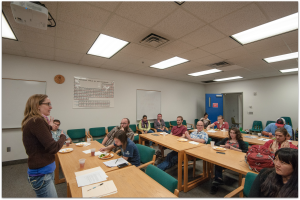
The University of Utah student chapter at their first meeting, held less than one month ago.
Image: Tao Wang
While the newly established University of Utah student chapter may just be getting off the ground, the group has big plans for the coming months. From outreach to collaboration to discovering new information, leadership of the new student chapter hopes that it will create both a sense of community and a forum for the exchange of knowledge.
“The student chapter is actually really good for the student population here because there’s not a lot of community involvement type activities for graduate students.” says Sara Koepke, chair of the University of Utah student chapter. “Moving in this direction is a really positive thing.”
For Koepke, outreach and scientific communication will play a large role in the direction of the student chapter. One of the first activities of the student chapter will be a professional development workshop, focusing on presentation skills for the communication of scientific research. The group also plans to begin outreach to schools, going to areas with the greatest need and presenting live demonstrations and practical lessons.
“The more people that know how important science is, the more likely that you’re going to have people willing to vote for such things as funding of the National Science Foundation or any other political movement that is necessary for the sciences,” says Koepke, currently a graduate student at the Minteer Research Group.
Additionally, Koepke believes that this type of outreach has the potential to inspire young students to pursue the sciences.
“Just from a woman’s perspective, I think outreach is important because women drop out of STEM at a higher rate than men do,” says Koepke.
Aside from the outreach component, Koepke plans to bring in seminar speakers and special teaching topics. While the group mainly consists of students from the university’s chemistry department, there is much variety between their chosen research topics. With this, the group has the potential to broaden their interests and advance new research.
“New speakers can educate us in directions that we wouldn’t necessarily go,” says Koepke. “I love this sort of thing because I like to hear seminar speakers; it’s new information. I can always get ideas from things that aren’t related to what I’m doing.”
Above all, Kopeke hopes that the student chapter can open new doors to both collaboration and information sharing. Not only does she believe this will help in research efforts, but also for the socializing between groups that is currently not happening on campus.
“The biggest thing that I can hope for is that this group will provide more community,” says Koepek.
Learn more about ECS student chapters.

